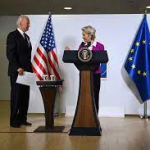 The United States and the European Union have ended their dispute over steel and aluminium tariffs, promising to work together on a global agreement to combat production and industry overcapacity.
The United States and the European Union have ended their dispute over steel and aluminium tariffs, promising to work together on a global agreement to combat production and industry overcapacity.
The future EU-US deal will be a challenge for China, which produces more than half of the world’s steel and which the EU and US accuse of creating overcapacity that threatens the survival of their steel industries.
“The United States and the European Union have reached an important breakthrough that will address the existential threat of climate change while protecting American jobs and industry,” US President Joe Biden reported at a joint event with European Commission chief Ursula von der Leyen on the sidelines of the G20 summit.
Under the agreement, Washington will allow EU countries duty-free access to steel and aluminium exports to the US in volumes comparable to those shipped before tariffs imposed by former President Donald Trump’s administration in 2018.
In response, the EU removed retaliatory tariffs on US products, including whiskey, speedboats and Harley-Davidson motorbikes.
But rather than a simple return to the status quo in 2018, the US and EU plan to address the existential threat of climate change and overcapacity in the steel industry, which is one of the world’s largest CO2 emitters.
“Together, the United States and the European Union will work to limit access to their markets for steel and limit access to countries that dump steel into our markets, contributing to global oversupply,” the White House announced without directly naming China.
The global agreement is to be worked out over the next two years to promote “green” steel and aluminium production and will be open to other countries that want to join, including China, whose steel sector is responsible for 10-20% of the country’s CO2 emissions.
The US Commerce Department reported that Washington was consulting with Japan and Britain on steel and aluminium issues, with a focus on the impact of overcapacity on global steel and aluminium markets.
“The global agreement will seek to ensure the long-term viability of our industries, encourage the production and trade of low-carbon steel and aluminium and restore market-oriented conditions,” the European Commission said in a statement.
.gif) Loading
Loading

